A Laugh to Fit the Bill
The biggest heart on campus leaves as English professor Gary Enke retires after 31 years at Mt. SAC
Gary Enke leads a march on the lawn of the Founder’s Hall in front of Mt. SAC in Walnut, California on May 8, 2019. Mt. SAC Staff and Faculty had been protesting to prevent the change in healtcare plans with Enke and others leading protests to keep their health care plans. Photo credit: Abraham Navarro/SAC.Media.
Once you hear Gary Enke laugh, you never forget the way it sounds. It’s the kind of sound that just makes you want to smile, no matter the mood, and if a sound could replace the sun, his trademark laugh would fit the bill. That’s only one of the many things that makes Enke, 55, such a memorable person, and one of the things that makes his retirement as a professor just a little more bittersweet for those who know him.
June 17 marked the end of English professor Gary Enke’s time at Mt. SAC. The spring 2020 semester, in which all instruction had suddenly shifted online thanks to the COVID-19 pandemic, will be Enke’s last. What started as an adjunct position in 1989 turned into a 31-year tenure.
Since he first stepped foot on campus, Enke has become known among students and faculty for the pep in his step and cheerful teaching style.
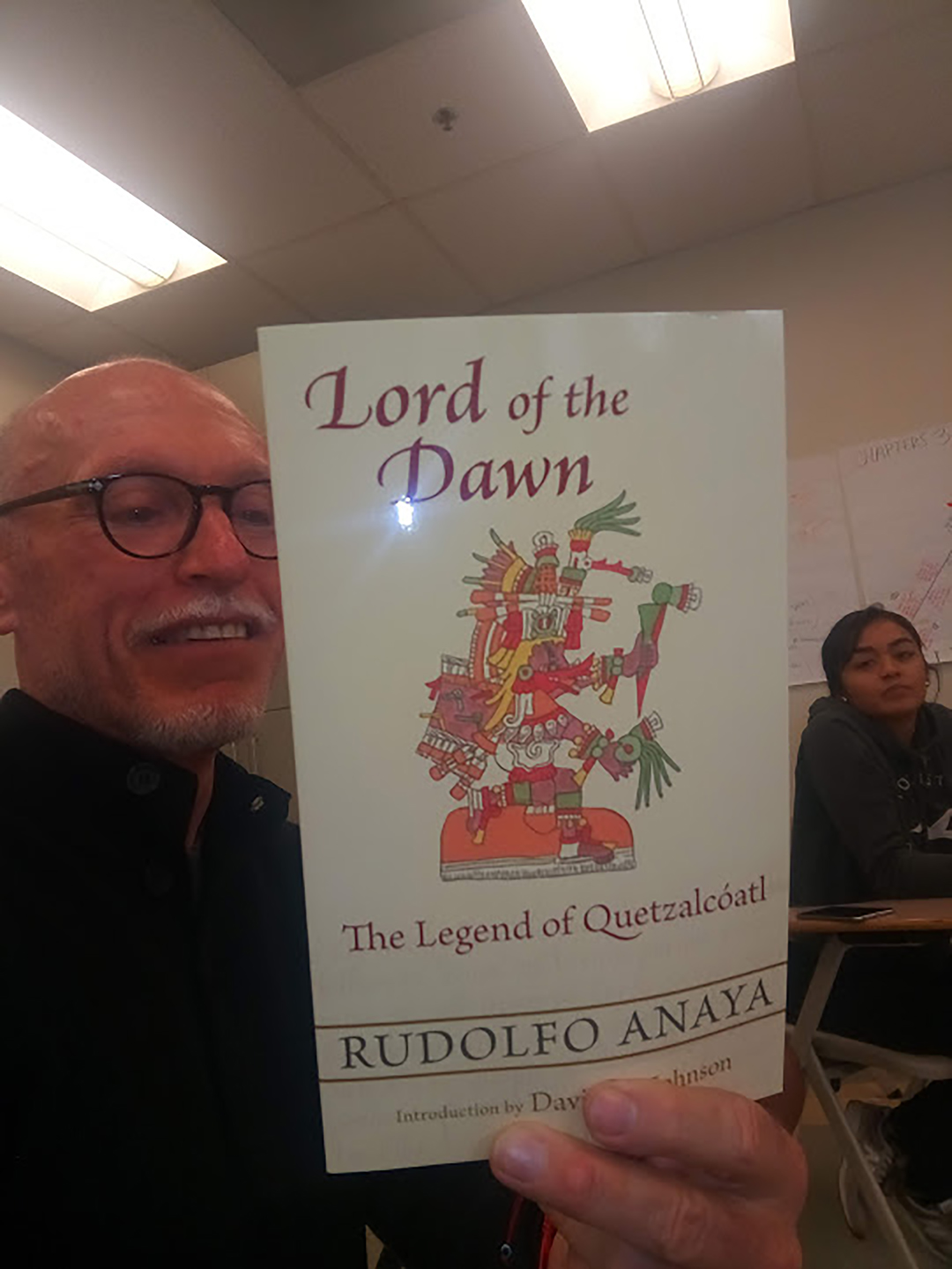
One former student who remembered Enke’s spirited teaching fondly is current English department co-chair Kimberly Quintana-Mullane.
“He was exactly the way he is now: bubbly, effervescent, just amused by life, so sweet and supportive,” Quintana-Mullane said. Back then, she had taken three of his classes and could recall some of his interesting wardrobe choices, which included shorts and high socks in the ’90s.
Kristina Allende, professor of English, was also a student of Enke’s in the early 1990s.
“I remember thinking he was cool because he was young and wore overalls,” Allende said. But Allende added that once she was hired at Mt. SAC and became his colleague, she didn’t just think he was cool, but knew he was cool.
“Gary is a true teacher. I have never seen him make any decision at work that was not based on it being good for students,” Allende said. “I am so fortunate to have been Gary’s student and his colleague and to continue to be his friend.”
Associate Dean of Humanities and Social Sciences Jeanne Marie Velickovic agreed.
“When I think of Gary Enke, his huge smile and hearty laugh immediately come to mind. Gary embraces life with enthusiasm, passion and a heart for students. He cares deeply about others, especially those who have faced injustices or have been marginalized,” Velickovic said.
Enke, who was born in Walnut Creek and was raised in San Ramon, grew up in a working class family. His father worked as a land surveyor while his mother stayed home, and he was the oldest child of the family, living with a brother and sister.
“One of the things I’m looking forward to doing knowing I’m not going to be around people is to go up to see them,” Enke said.
And although his excitement is a clear indication of how much he loves his family, they did hit a bit of a snag when he came out to them as gay.
“I told them on my 30th birthday, and so those are different times,” Enke said. “And I figured that if I told them on my birthday, no one could get mad that I’d ruined any of the holidays.”
He said that no drama came from the incident, but his mother did become angry and wrote a letter demanding he not tell his grandmother (even though his grandmother had already known about it and, according to Enke, did not care).
Enke said that his brother had told him that ‘there was a lot of conflict’ between his parents about which of them was to blame following his coming out. “But they didn’t really express much of that directly to me,” Enke said. “And then gradually they treated me like they always have.”
“I think after 30 when you’re not married, you know, after a while, things are just not a shock,” Enke added. “They’ve never treated me any differently since then.”
Enke eventually met his husband Ismael on the Whittier Narrows in south El Monte, Ismael on his bike and Enke on his regular jogs. They became familiar faces for each other, as they would run into and greet one another several times on these trails.
The fact that Enke is fluent in Spanish helped him develop his relationship with Ismael. He began learning the language in seventh grade and was able to practice it in high school by talking to the El Salvadorian children of San Ramon.
“When he heard me speak Spanish, I think he thought I was police or la migra, and then ultimately we just started talking to one other,” Enke said.
According to Enke, the couple mostly communicated with each other in Spanish throughout their relationship. Although Ismael did learn some English attending an adult school later in his life and was able to talk to Enke’s parents and others that way, Ismael still spoke mostly in Spanish to Enke.
Enke’s not just bilingual, though. While Enke was spending his college years studying to be a priest, he picked up on several other languages. He went into a seminary for a diocese in Oakland (a diocese is a district under the supervision of a bishop) and later arrived at a Benedictine monastery in Portola Valley.
“I know Latin and Greek from studying to be a priest, and also because my academic field was medieval literature,” Enke said. “In graduate school, I learned Old English. I studied Sanskrit because I wanted to read some Indian texts.” He also studied French from the Middle Ages, and although he can read both modern French and Italian, he said he can’t speak either one.
However, Enke didn’t go on to become a full-fledged priest. In the last year of his undergraduate studies, he started staying in a monastery and became a postulant.
“The postulant is just the very, very first step. That’s the only part I did,” Enke said. “And I left before I was supposed to go back to New Hampshire for the next stage, which is a novitiate.”
During his time at the monastery, Enke said that a school he taught high school students at was “for really, really rich kids.”
“I couldn’t really imagine spending my life working for people who are extraordinarily privileged,” Enke said. “Some of them were children of billionaires, so not even just ordinary wealthy people, but the super rich.”
Enke originally didn’t plan on his leave from the monastery being permanent, and likewise, his arrival at Mt. SAC wasn’t planned. He was originally intending to get his doctorate in medieval studies at Claremont Graduate University.
“I started working at Mt. SAC because I needed the money,” Enke said.
His friend Matthew Judd, who is now the Dean of Natural Sciences at Mt. SAC, was the one who brought up the opportunity to Enke. At the time, Judd was in the doctoral program with Enke and an adjunct English professor at the college.
Little did Enke know how much that opportunity would change his life.
“I started teaching there just to support myself while I was going to grad school, but once I started teaching at Mt. SAC, I just loved it,” Enke said. He continued teaching at Mt. SAC and eventually applied to work full-time, despite his belief that he wouldn’t get the job. “It’s just kind of the way my life went off in its own direction.”
And Enke went on to become a notable figure in Mt. SAC’s English department, thanks to his dynamic teaching style. His high energy takes him all across the classroom during his lectures.
Of course, Enke is not lovable only because he has a lively personality. Enke’s ability to support and form close relationships with his students is also one of the things that makes him so memorable for students and faculty.
Abraham Navarro, a former student of Enke’s, recalled his first impression of his professor.
“The most striking thing was that this white man with lightning-blue eyes started speaking machine-gun Spanish faster than my grandma,” Navarro said. Navarro also credited Enke with pushing him towards journalism at Mt. SAC.
“I was pretty bummed about something that happened in my life and I was moping around campus,” Navarro added. “He told me to do what I thought I could do and that I could do it. I definitely would not be where I am now if it wasn’t for him.”
Navarro is now the editor-in-chief of SAC.Media.
The fact that Enke encouraged Navarro’s direction in journalism didn’t surprise journalism professor and student media adviser Toni Albertson. “That’s just how Gary is,” she said. “Gary knows every student personally and really knows their struggles and is always there to be their champion and their friend, and that’s what I love about him.”
“Gary would walk students up to the newsroom, introduce them to me, and tell me that this person has talent and should be writing for the student media,” she added. “And he was always right on!”
Albertson said that one of Enke’s best qualities is how he is able to spot talent in students who may not even know it’s there.
“Watching a student hear someone like Gary talk about how awesome he thinks they are was like watching him inject a giant dose of confidence in the student. It was magical to watch, and their smiles said it all,” she said.
The same could be said for former SAC.Media sports editor Brigette Lugo, who is transferring to San Francisco State University in the fall. Lugo and Enke bonded over the need for representation of the Latinx community at Mt. SAC. When Lugo created Somos, a Latinx student media platform, Enke was there to brainstorm ideas and offer his encouragement. Lugo explained:
“Right off the bat, he was so friendly, so positive. You don’t meet a lot of people who are so welcoming and open. He was very interested in SOMOS and was always looking for ways to help me with it, offering his insight with clubs or professors who are allies to certain causes on campus, introducing me to the coordinator of the DREAM program. He was always looking out for everyone, but he was this really strong ally to the Latinx community.”
But it was his positivity that stuck out the most to her.
Lugo added that Enke’s support for the journalism program made an impact on her and the student staff.
“I think that Gary always appreciated our program because he’s someone who definitely wants the truth. He’s an activist as well. I hope he doesn’t mind me calling him that, but he’s definitely an activist,” Lugo said. “He marched with Dreamers. He spoke up at the board of trustees meeting for faculty healthcare and shared his story. I just think that he’s always been someone that fights for the truth and fights for others.”
Enke also was the chair of the English, literature and journalism department for years. Albertson said that Enke never missed a journalism banquet and that his presence spoke volumes. Lugo said it was another way of him showing his support, but also to show how proud he was. He always made an impromptu speech to acknowledge the students and their work.
“That little gesture of him being there and having such an important position on campus always supporting the journalism program was always so uplifting,” Lugo said. “I won’t lie, I got a margarita and he would get himself a shot and we would talk about everything, having fun and speaking Spanglish. We all knew Gary was on our side, that he was one of us.”
Just as he’s helped his students, Quintana-Mullane said that it was the same for faculty members.
“I know that he has been there for me through some really difficult personal obstacles, and I can imagine that he’s been there for a huge number of people in our department,” Quinana-Mullane said.
Albertson had similar thoughts. “Gary always has the right answers. He’s been a shoulder to cry on, and a support to lean on,” she said.
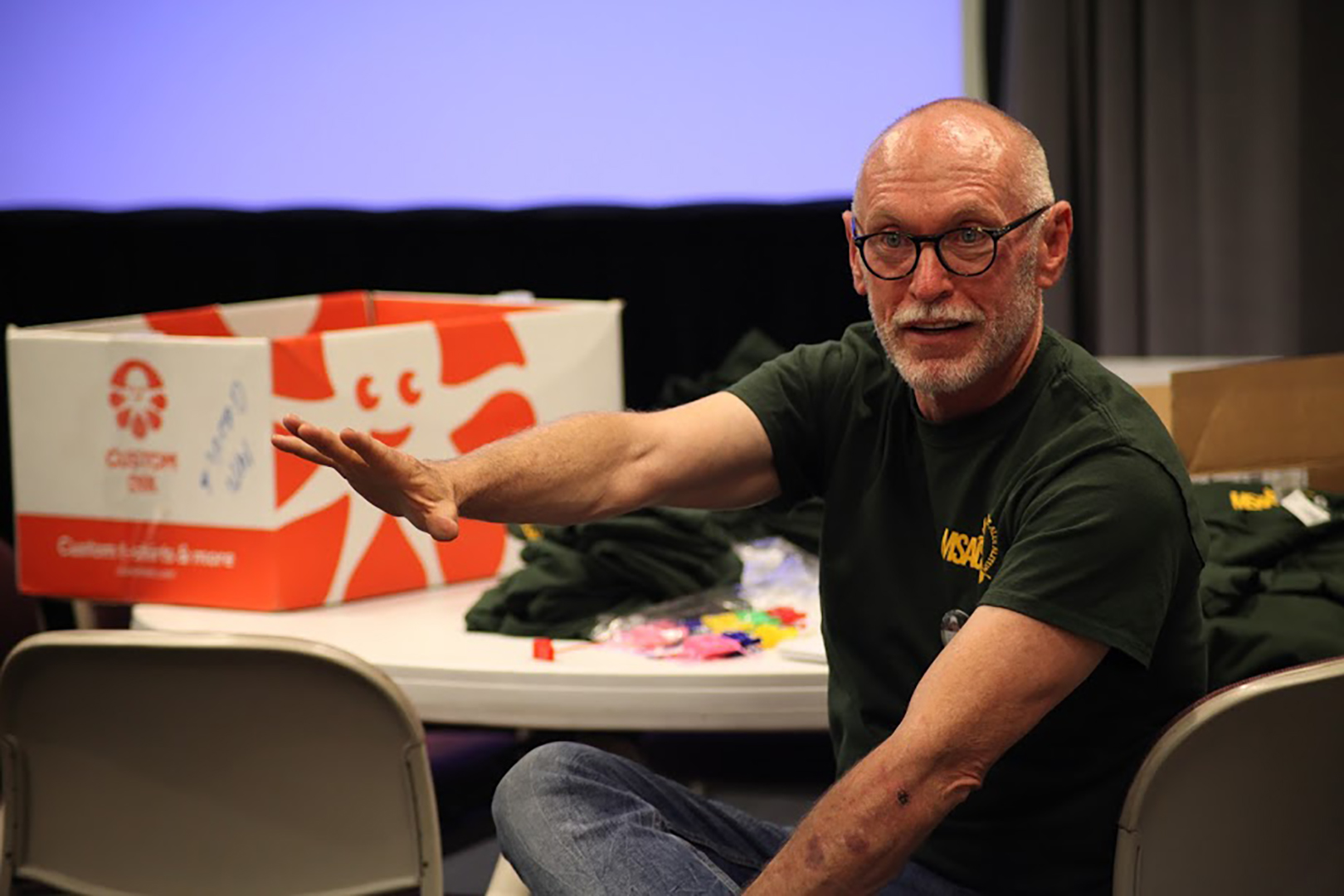
And when faculty members began protesting against a proposed switch in their healthcare, Enke showed just how resolute he was in his support for others. Enke was a key figure in the protests, having organized and appeared at demonstration after demonstration. Joan Sholars, professor of mathematics and computer science, and president of the Faculty Association, worked together with Enke to organize and support faculty. But for Sholars, it is his connection to students that stands out.
“Gary was the kind of professor every student needs at least once in their life. His heart and soul were devoted to his students,” Sholars said. “His devotion to teaching and to his belief that every student is important are part of his psyche. Gary will be missed and will be very hard, if not impossible, to replace.”
Despite Enke’s almost unwavering spirit, though, he has faced personal tragedy and loss—one of which was his husband.
When Ismael faced an encounter with police in Long Beach, he unfortunately became caught in the throes of immigration law. Ismael, who had arrived in the U.S. from Mexico in the ’90s, had an immigration hold at this point in time.
The Secure Communities Program, which ended in 2014, required local law enforcement to share immigrant detainees’ fingerprints with federal immigration authorities for the purpose of deportation.
Enke was not aware that Ismael had been moved to another facility for some time.
“He called me, and they had said they had moved him,” he said. “He was in a really freezing cold room with no blanket or anything.”
Enke went on to call his friend and colleague Allende, whose husband Victor worked in law enforcement. It was when Victor called the prison that Enke had found out Ismael was transferred to an ICE detention facility. Ismael was going to be sent back to Mexico.
“I got together some stuff for him, and I go haul ass downtown to the immigration facility,” Enke said. “But they wouldn’t let me give him anything. The people there were pretty heartless.”
Ismael was able to contact Enke again when he was given his phone and wallet back, and Enke went to Tijuana to meet with Ismael after he had been taken back to Mexico.
They later made three attempts to bring Ismael back to the U.S., once through Tijuana, another through Mexicali, and the last through Arizona. The last incident on the border of Arizona in particular involved someone requiring Ismael to carry drugs, according to Enke. Ismael refused, and under Enke’s advice, made an excuse to leave the situation.
“By then, that’s when he was getting sick,” Enke said. “He had been having a lot of intestinal problems.”
Enke had gone back down to Mexico to visit Ismael right after Christmas.
“I wasn’t going to go because we were trying to save the money to figure out what to do next,” Enke said. “But then when he started getting sick, I came down for Christmas and stayed until winter session started, and I had to come back and work.”
Ismael died the following January.
Enke said that he doesn’t talk about some details of the story. “I don’t tell because it was his story, and he wanted it that way,” Enke said.
Enke faced another tragic loss about a year ago, and this time, with a student of his. In April 2019, Mt. SAC student Luis Sanchez lost his battle with cancer.
“That was just awful and I just lost it,” Enke said.
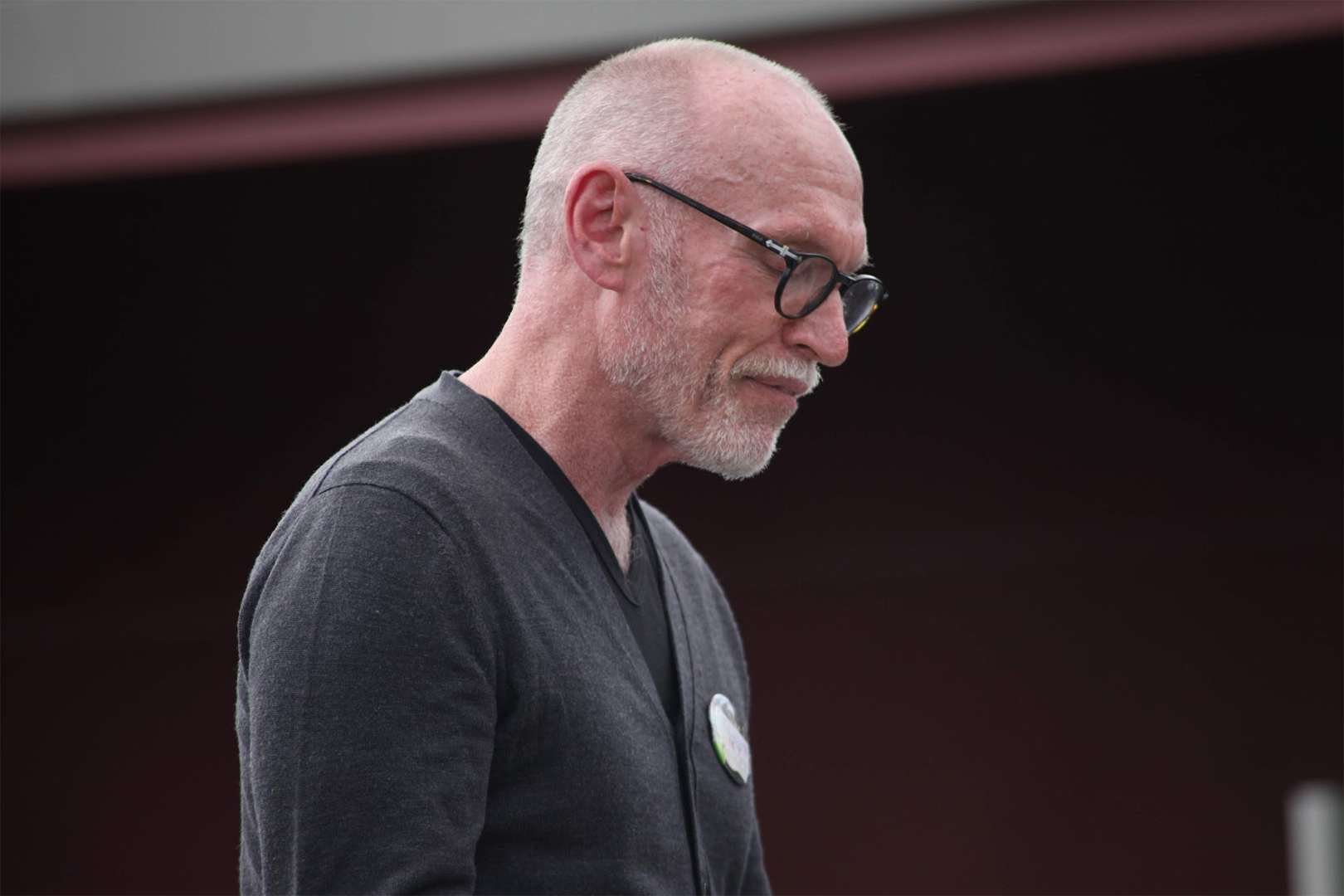
Sanchez and Enke had grown close, especially outside of the classroom where they both attended protests and walks to support undocumented students. Enke was even asked by Sanchez’s sister to deliver a eulogy at the church.
“That was kind of how close I was. I gave his eulogy at his funeral. So when I saw that they planted an elm tree for him in front of the Equity Center, when I go by and see that, it just brings back all those memories,” Enke said. “He was really an amazing person.”
Enke was active in the college’s Bridge Program, which supports graduating high school students to acclimate to college life, build connections and get over the fears of college. He was also very active with the DREAM program, which provides support to undocumented students. Enke taught in both programs collectively for over 15 years.
Anabel Perez, counselor and coordinator of the Bridge Program, said that thanks to Enke’s advocacy, the DREAM Program expanded to include English Learning Communities. She said that on a professional level, Enke taught her the ways of faculty culture at Mt. SAC when she first started working at Mt. SAC.
“He showed me, by his actions, how a professor should be: kind, empathetic, knowledgeable and most of all, loving,” Perez said. “Gary has mentored many students, but also many colleagues as well.”
She added that Enke is more than a colleague.
Regardless of the challenges and losses Enke has faced, he still remains perpetually cheerful and supportive for causes he believes in—and that has made everyone he’s touched begin to deeply miss him.
Enke said that he chose to retire at the end of the spring semester because he was “ready to do something new.”
“And with COVID and teaching online, it gave me kind of a natural transition,” Enke said. He added that he was planning to retire in a year or two regardless, and that staying longer at Mt. SAC wouldn’t have made a large difference in his income.
With Enke’s departure, he is leaving behind a void that will be hard to fill, but also leaves what Navarro called “a sense of helpfulness” to everyone on campus.
“His presence is going to be missed on campus,” Navarro said.
Albertson said Enke leaving goes far beyond a professor retiring.
When Enke left the campus, many said that he took with him a sense of activism and an infectious energy that could rally anyone to a cause, whether it be for faculty health benefits, undocumented students or LGBTQ+ rights.
Quintana-Mullane described what she will miss the most about Enke.
“I think his joy, that special high energy that he brings to the department. We’re really just going to miss his personality,” Quintana-Mullane said.
Enke said that he doesn’t really have a plan for what he will be doing in retirement.
“I wanted to retire young so I could do stuff before I was too old to do things like go on really long hikes,” Enke said. “I also don’t have a lot of plans, and I just want to see what comes about next.”
Enke has been a positive influence on the lives of many, and has always been a kind shoulder to cry on for those who need it.
“I think the sentiment is basically, ‘We’re so sad for ourselves, but so happy for you,’” Quintana-Mullane said.
Velickovic said that Enke may retire, but his legacy will remain.
Whatever happens next in Enke’s life as he goes forward is unclear, but there is one thing that everyone knows for sure—his life from now on is going to be one filled with a thirst for exploration and late-night tequila runs, always scored with his patented laugh that so many have come to love.
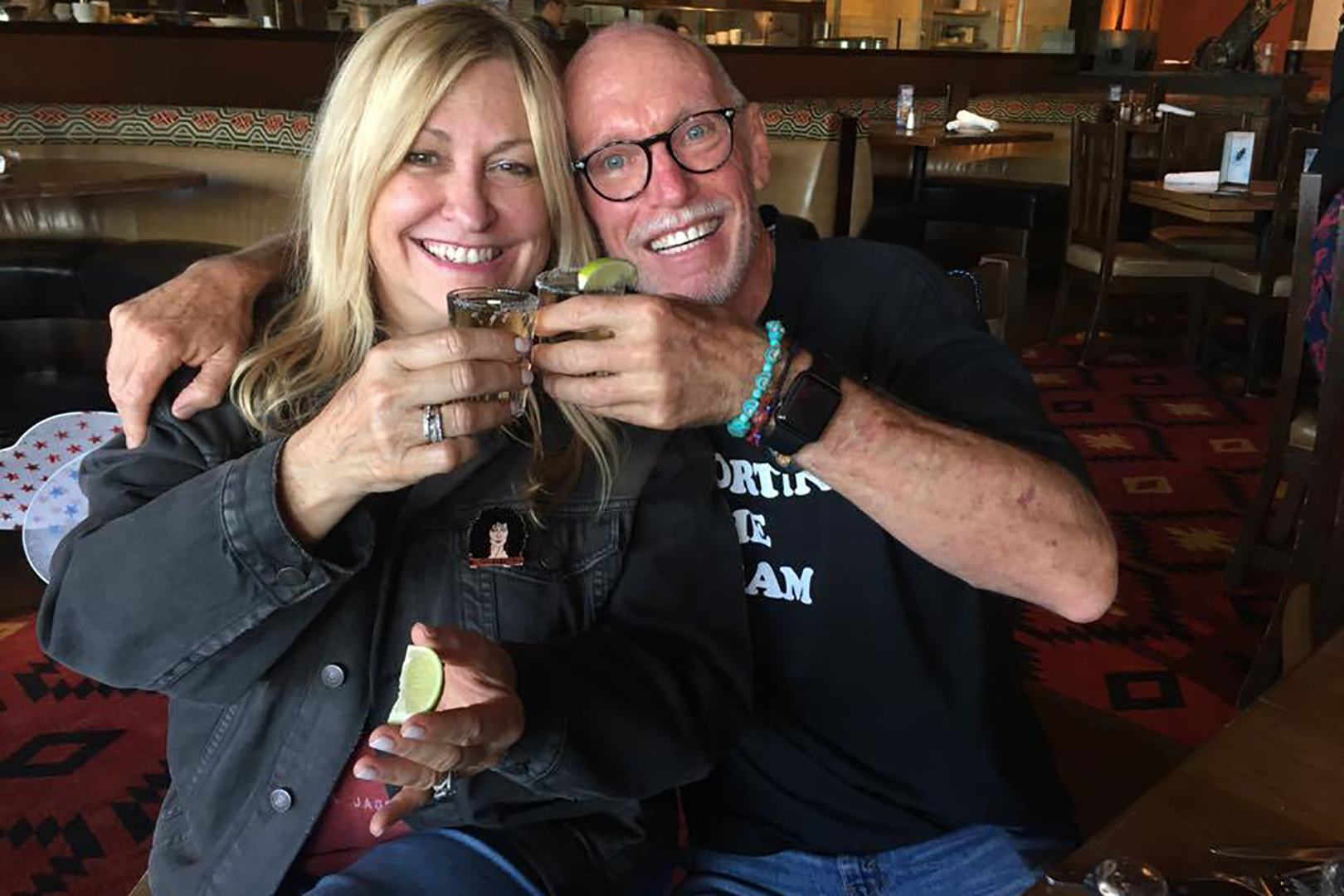

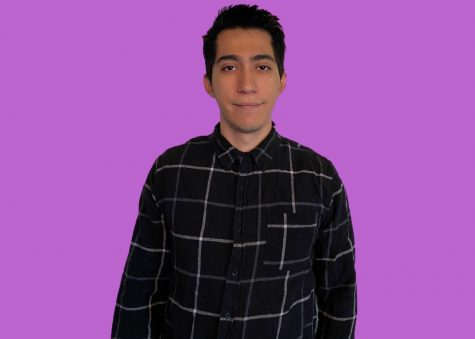


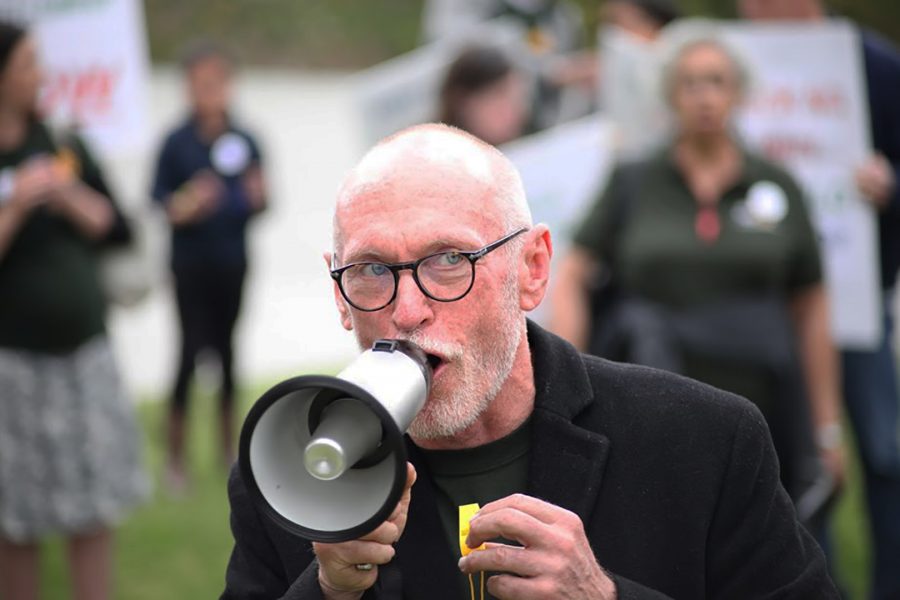

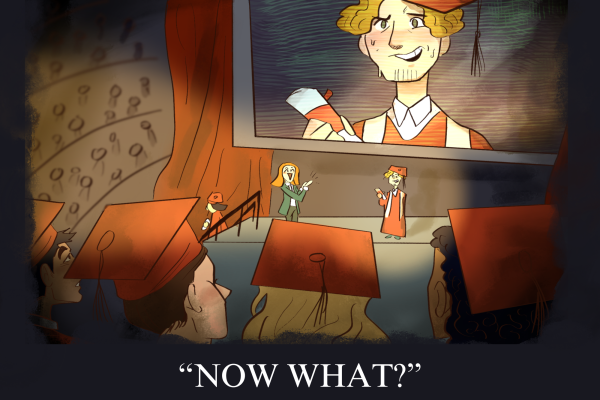

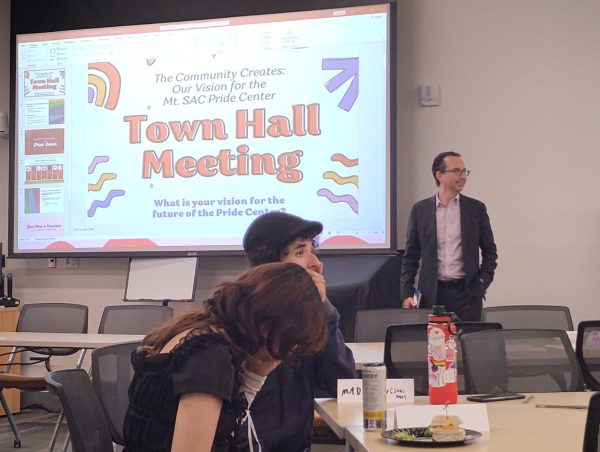
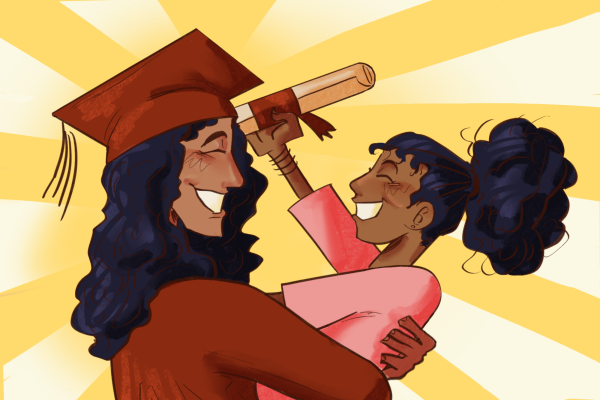
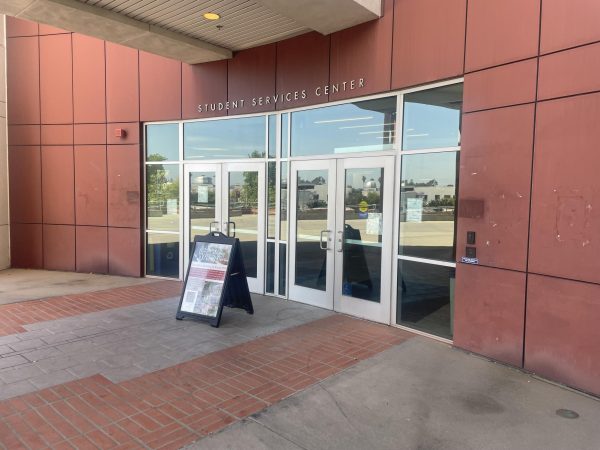




Adrienne • Sep 5, 2021 at 6:58 pm
Thank you for this riveting article. Professor Enke was so instrumental in fueling my love for literature. He made the written, old English word come alive as if it were a play, and you have a front row seat via the classroom. He was kind, but quirky and funny. I find myself now, thirty years later, remembering him fondly and praying his new endeavors send him on some kind of an adventure–he so deserves it.